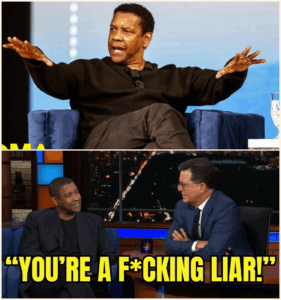Denzel Washington Leaves Colbert Stunned in Explosive On-Air Confrontation

What was meant to be a routine late-night interview turned into one of television’s most unforgettable moments. The Ed Sullivan Theater was electric with anticipation as Denzel Washington appeared on The Late Show to promote his latest film — a powerful drama about redemption and second chances. Fans expected charm, thoughtful conversation, and maybe a few laughs. What they got instead was a confrontation that would light up social media for days.
Tensions Simmer Behind the Scenes
Colbert’s writers had reportedly prepared a list of pointed, even provocative, questions. Their goal: press Denzel on his Christian faith and social views. Colbert, confident in his progressive audience, leaned into the challenge, ready to push boundaries.
The evening started smoothly. Colbert opened with his usual monologue, and Denzel entered to enthusiastic applause, radiating his signature charisma. The first few minutes were easygoing — jokes about his legendary work ethic, lighthearted banter about the film. But the tone shifted when Colbert leaned in, his expression sharpening.
From Film Talk to Flashpoint
“This new movie deals with forgiveness and redemption,” Colbert began. “How did your faith shape your performance?”
Denzel answered thoughtfully: “Faith helps us understand forgiveness. My character made mistakes, but he’s searching for a way back.” The audience nodded along.
Then Colbert pressed harder. “You’ve spoken openly about your faith. Isn’t it a bit ironic for actors to lecture on moral values?”
Denzel blinked, caught off guard but calm. “I’m not lecturing anyone. I’m sharing what’s real for me. People can take what speaks to them and leave the rest.”
The tone turned sharper. “You stay quiet on hot-button issues — marriage equality, women’s rights. Isn’t that playing it safe?”
The studio went quiet. Denzel’s jaw tightened, but his voice stayed steady. “My faith teaches me to love, not to judge. I’m not a politician. I don’t ask anyone to live by my beliefs.”
Colbert wouldn’t let up. “Silence is still a stance, isn’t it?”
Denzel’s smile faded. “Are we here to talk about the film, or are you chasing a viral moment?”
The Clash Intensifies
Colbert reframed his attack. “You have influence. Shouldn’t audiences know where you stand?”
Denzel’s voice carried a quiet edge. “Stand on issues that matter to whom? Your audience? Or the millions who just want to watch a film that makes them feel hope?”
Colbert raised the stakes. “Democracy is under attack. Women’s rights are being stripped. Staying silent while talking about faith — isn’t that a contradiction?”
Denzel shot back: “I’ve never claimed to be a moral authority. I share my life. You’re trying to force me into boxes that work for your show.”
Colbert pushed further, accusing Denzel of dodging accountability.
Denzel’s voice rose. “Maybe someone’s relationship with God doesn’t fit into your talking points. Maybe respect means not turning people into props for your agenda.”
The audience erupted — half in applause, half in stunned silence.
“This Isn’t an Interview — It’s an Ambush”
Colbert snapped, “So staying neutral is what you call respect?”
Denzel stood, breaking his composure. “Ambushing a guest to force politics isn’t respect.”
Colbert barked back, “Sit down, Denzel. This is exactly the kind of deflection I mean.”
Denzel stayed on his feet, towering over the desk. “You invited me here to talk about a movie. Instead, you want a political punching bag.”
Colbert’s tone turned cutting. “You’re a public figure — you should handle tough questions. Unless your faith only works when everyone’s nice.”
Denzel’s eyes flashed. “My faith taught me to turn the other cheek. But it also taught me not to cast pearls before swine.”
The room went silent. Colbert sputtered, “Did you just call me a swine?”
“I called it how I see it,” Denzel said evenly. “You’re sitting behind that desk tearing down a man’s character for entertainment. What would you call that?”
The Walkout
Colbert accused him of “cowardice disguised as wisdom.”
Denzel stepped closer, his voice cold. “Cowardice is hiding behind comedy to attack people. Cowardice is what you’re doing right now.”
The room was frozen.
Colbert tried again: “If you can’t handle real questions, maybe you shouldn’t do interviews.”
Denzel shook his head. “Or maybe I should stick to interviewers who know the difference between asking tough questions and staging an ambush.”
Finally, Denzel adjusted his jacket, looked into the camera, and delivered his final line:
“You’re right, Stephen. I am walking away. Not because I can’t handle the heat — but because I respect myself too much to stay in this circus.”
He turned to the audience: “If you came here expecting to hear about a film about forgiveness and redemption, I’m sorry. The movie opens Friday. Judge it on its own merits.”
And with that, Denzel walked off set.
Aftermath
The internet exploded. #DenzelWalksOut trended globally. Critics slammed Colbert for blindsiding his guest; fans praised Denzel for his composure. Late-night ratings dropped, and Colbert’s reputation took a serious hit.
In the end, Denzel Washington walked away with his dignity intact — while Stephen Colbert was left behind his desk, grappling with the fallout of mistaking provocation for courage.